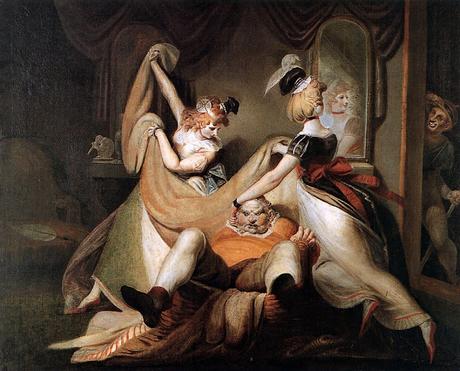by Paul J. Pelkonen

Falstaff in the Basket by Henry Fuseli
© Die Kunsthaus, Zurich
These performances use a reduction for two pianos and three other minor soloists under the expert and enthusiastic baton of Teddy Poll. Even without Nicolai's orchestra, the work proved to be full of Shakespearean charm. While the arias, ensembles and choruses were sung in the original German, director John Giampietro arranged a new, ambitious English version of the spoken dialog (used in singspiel instead of recitative .) The result: a smart and canny performance that used the best from both playwright and composer. Less successful (and ultimately unnecessary) was the decision to update the action a munitions factory in Windsor in 1941.
Andrew Rosen was Falstaff, here portrayed as a British Army officer with an elaborate, sweeping mustache and the traditional gut-pillow, that jutted forward like the prow of some enormous water-craft. He played the role of the fat knight to the hilt, capturing the character's bottomless joie de vivre as well as the melancholy, philosophical side of Jack that makes him so memorable. His comic confrontation with the jealous Fluth (played by promising Polish baritone Hubert Zapior) was a definite selling point in the second act.
Shakespeare wrote The Merry Wives because Queen Elizabeth loved the Falstaff character and wanted to "see him in love." This show certainly offers that, putting Falstaff and his amorous ambitions against the wizardry and schemes of Meg and Alice. Whether being dumped in the laundry basket, dressed as an elderly woman (this is the only operatic version of Wives to include this plot point) or putting on antlers as Herne the Hunter, this was a most memorable vision of old, plump Jack. However, as Falstaff's traditional cohorts Bardolph, Nym and Pistol are missing from this version, the old guy sometimes seems outgunned.
Alice Ford and Meg Page (the opera renames"Fluth" and "Reich") are the emotional center of his little comedy. Soprano Christine Taylor Price and mezzo Kady Evanyshyn showed a fearless attitude toward the opera's high-flying, heavily ornamented arias, which use some of the same fioratura style that adorned Italian buffo comedies. The two of them singing together in a complex duet was one of the delights of the first act. Ms. Price was particularly effective as Alice, giving her a gutsy, no-nonsense demeanor when confronting the amorous Falstaff or her jealous, foolish husband Fluth. (A scene where Fluth/Ford winds up in Jack's famous laundry basket was the funniest moment of the night.)
Much of the clowning is given to Spärlich (Matthew Pearce) and Dr. Caius (Andrew Munn) the two gentlemen who are obsessed with wooing Anne. This little triangle and Nan's actual love story with Fenton (John Chongyoon Noh) provided some of the most memorable melodies and enjoyable grist. Soprano Jessica Niles is a promising talent, as is Mr. Noh. The scene stealer was Mr. Munn, clomping about in a great pair of work boots and speaking with an outrageous accent, he then proved to have an impressive, full bass with pleasing low notes.
Although Mr. Giampetro's attempts to include more aspects of Shakespeare sometimes seemed forced (a drinking scene with a vision of Prince Hal is especially awkward) this was an admirable performance of an opera that demands further study, performance and revival. At the conclusion of the third trick in Windsor Forest, Falstaff went to each of the cast in turn, apologizing for his behaviors and promising to reform himself. He then did the same to the audience, going from seat to seat with muttering "I'm sorry, I'm sorry." But with comedy like this, no apologies were needed.

